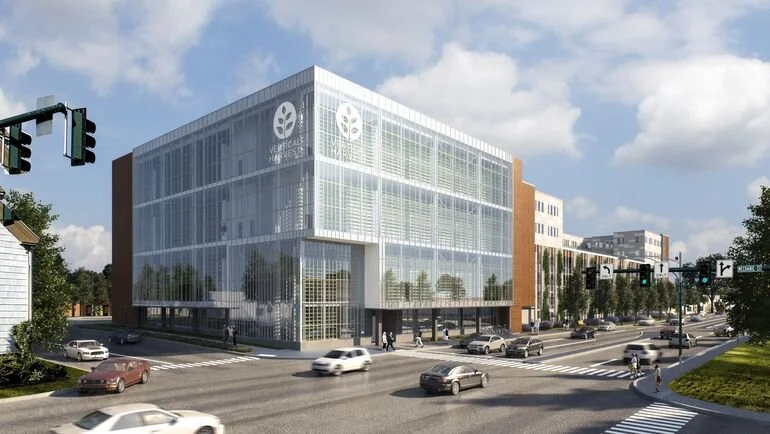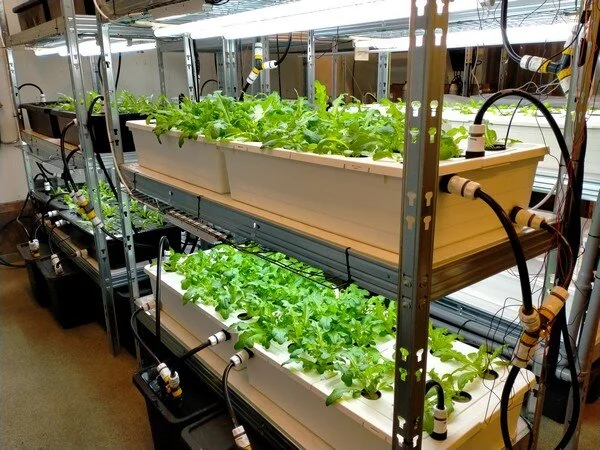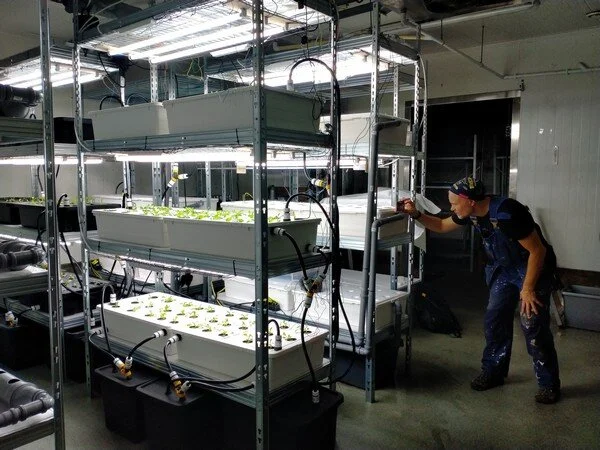
Welcome to iGrow News, Your Source for the World of Indoor Vertical Farming
Vertical Harvest, MedRhythms Get FAME Financing to Advance Growth Plans
The Finance Authority of Maine has approved a total of nearly $50 million in financing for two startups — Vertical Harvest L3C, which plans to launch a hydroponic greenhouse in Westbrook, and a Portland provider of "digital therapeutics," MedRhythms Inc.
By Catie Joyce-Bulay
July 19, 2021
The Finance Authority of Maine has approved a total of nearly $50 million in financing for two startups — Vertical Harvest L3C, which plans to launch a hydroponic greenhouse in Westbrook, and a Portland provider of "digital therapeutics," MedRhythms Inc.
Vertical Harvest will receive $45 million in conduit bond financing. The company plans to produce over 1 million pounds of produce annually, and FAME's funds will be used to finance a portion of the construction costs to build 70,000-square-foot Westbrook farming facility. The project ultimately is expected to create approximately 50 full- and part-time jobs, many of which are expected to be performed by individuals with disabilities.
The project is part of a larger master-planned development that is expected to include affordable housing and parking in downtown Westbrook. Because the project will treat wastewater as an exempt facility, all or a portion of the bonds will be eligible for tax-exempt treatment under federal tax law.
“We appreciate FAME’s support for the agricultural component of this project,” said Greg Day, president of TDB LLC, developer of the project. “This master-planned program establishes a compelling business model for food production in an urban core that our firm is expanding to other communities throughout New England and the nation.”
Vertical Harvest plans to break ground on the facility in the fall. It's expected to be Maine’s first vertical farm, and the country’s second. The company’s first location in Jackson Hole, Wyo., was the first of its kind and has been operating for five years.
MedRhythms, Inc. will receive tax credit certificates related to approximately $2.8 million in investments through the Maine New Markets Capital Investment Program to help with the costs of a commercialization strategy of its device and software for stroke rehabilitation. The certificates authorize the issuance by the state of approximately $1.1 million in tax credits through the program.
“We are pleased to support MedRhythms’ plans to advance their digital therapeutic for stroke rehabilitation, as well as additional research and development,” said David Daigler, chair of the FAME board. “Digital therapeutics are a cutting-edge field that can help to improve the everyday lives of Mainers and other patients who will benefit from the company’s technology.”
MedRhythms uses sensors, music, and software to build solutions that measure and improve walking. The company, which currently employs 18 individuals, with 13 full-time employees in Maine, hopes to triple its workforce in the next few years.
“Digital therapeutics are the future of health care, and we appreciate the support of FAME,” said Brian Harris, CEO and founder of MedRhythms.
FAME uses tax-exempt private activity bonds, or “conduit bonds,” which are authorized by the Internal Revenue Code in order to stimulate economic development in certain targeted industries. The projects financed in recent years range from nonprofit health and higher education projects to solid waste improvements, public infrastructure and manufacturing.
Lead Photo: A 300,000-square-foot Westbrook building, shown in this rendering, is expected to house the Vertical Harvest indoor farm, as well as apartments, parking and commercial space.
An Affordable Solution To Monitor And Optimize Food Production
Ecobloom, a startup based in Stockholm, provides two different solutions to the vertical farming space. The first solution is a B2B product, namely an AI solution ensuring automated growing of the plant and monitors plant food production at the same time
By Rebekka Boekhout
July 9, 2021
“We’re helping farmers optimize their food production through more efficient yield management,” says Hamza Qadoumi, CEO and founder of Ecobloom. “Also, cost reduction comes in through a significant reduction in labor and yield increases up to 2 times more per year through accurate predictions. The system allows us to reduce food waste up to 20% through yield prediction and our deviation analysis.”
Ecobloom, a startup based in Stockholm, provides two different solutions to the vertical farming space. The first solution is a B2B product, namely an AI solution ensuring automated growing of the plant and monitors plant food production at the same time. With already a successful consumer product on the market, their focus is to offer smart technology solutions for the indoor farming market.
The pilot farm
Smart sensor - EcoSense
The company provides a software-connected plug-and-play solution named EcoSense. EcoSense is a small box that can basically be placed anywhere on the farm, such as above shelves to monitor plant growth. EcoSense comes in two formats: a camera for growth and plant analysis, sensors for water analysis and sensors for air analysis. Next to that the sensors predict yield, so lots of data can be gathered to keep improving this. Hamza notes, “We’re now looking at venturing with flowers and fruit greenhouse growers in Spain, Holland, The UK and the Middle East region.
The core solution of the device is hardware, sensors and cameras. Through these elements, the environmental sensors and plant environment is captured by data collectors and cameras throughout the plant’s life cycle. According to Hamza, farmers need about 1 device per 100m2. The wifi-connected cameras and sensors are modular solutions, using machine learning to constantly monitor and analyze plant development, health and stress. Through camera recognition, a certain yield outcome and deviations can be predicted.
Read the rest of the article here
For more information:
Hamza Qadoumi, CEO and founder
Ecobloom
hamza@ecobloom.se
www.ecobloom.se
Bucolic Kailash, An Agritech Startup, Brings “Computerized Farms” From The Future!
At the futuristic and smart agritech start-up “Bucolic Kailash”, a mission is becoming more real every day; the vision that soon in the very near future, starting and running farms profitably, will be as easy as downloading an app
July 6, 2021
At the futuristic and smart agritech start-up “Bucolic Kailash”, a mission is becoming more real every day; the vision that soon in the very near future, starting and running farms profitably, will be as easy as downloading an app.
Bucolic Kailash researches, manufactures and markets user-friendly life-growing computers. These computers are meant to enable economic and nutritional autonomy for its users. For example, one of the patented life-growing computers at Bucolic testing labs grows as much as Rs. 25 lakh worth of healthy produce annually in just 100 sq ft space with operational expenses of under Rs. 50,000/month for the user. Systems like these can be started with as low as 3 sq ft of space and scaled up with time.
Bucolic Kailash’s Vertical Garden and Vertical Farm System series are made to deliver super intensive and sustainable cultivation that is 100% organic, without soil and achieves more than 90% of water and energy saving. The smart agritech company has developed and acquired multiple patents on products and technologies that have shown promising results in the scope of personal, organized, and organic aquaponics farms. Their hydroponics computers grow up to 84 plants, vegetables, and salads in 1 sq ft. Their mushroom farming computers grow 50 Kgs of mushrooms in 3 sq ft every 45 days. Their fish-farming computer designs yield up to 800 Kgs of shrimps in just 10 sq mt every 150 days. All of this is achieved with IT, IoT and their custom developed life-growing AI. The Systems are engineered by closely working with its early customers and focusing on ease of use, AI & IoT powered automation and distribution. Engineering, Manufacturing, and IT has been the most guiding product shaper for the company’s early success.
Bucolic Kailash has unlocked a huge market for vertical farming, fish farming and hydroponic personal gardens.Their use of technological intervention empowers people to cultivate and harvest every day and in the comfort of their own homes through most efficient and effective ways. The company’s new offering under Vertical Garden system series ‘Tree of Wisdom – Eleganté’ is by far the most groundbreaking vertical hydroponics system the world has ever seen before. The product complies with ISO 9001:2015 for best in grade Quality Management and has been tested to meet the required hydroponics system parameter controls, as well as the state-of-art features. Tree of Wisdom - Eleganté has been doing well since its launch on 11th May 2021 at amazon.in.
The Company was founded by Mr. Utkarsh Sinha in March 2020 and now the company is a community of 18 carefully selected and nurtured members. During our interview with the founder, we found him very engaged and excited about the road ahead. Utkarsh graduated in MCIT-Computing from The University of Melbourne and B. Tech from MIT, Manipal. According to him, having worked with Godrej's R&D, Honeywell Aero HTS, Fagerhult OR Tech teams in India and Australia, helped him manage the company’s departments, processes, and make shipments possible from concept-to-product, even during the pandemic. The company runs its fully functional aquaponic devices manufacturing facility in Manipal on lean manufacturing and quality control principles.
On further talking with the founder, we found that the company’s mission with its life-growing computers is to ultimately enable community empowerment and economic development. The company believes that such life-changing science and technology should be available as user-friendly products. In the founder’s words, “It was a contrasting journey that I took back home to India in 2019 while having employment opportunities from companies in Australia that made me reflect upon my priorities and self-actualization needs. I wish to make communities exchange value through healthy food and money that can make coexistence wholesome.” We believe that Bucolic Kailash is a futuristic company that understands the needs of today's communities and a fast-changing world. They develop and market environmentally friendly agritech computers. The company has raised partial seed-funding after a year of setting up its manufacturing factory and distribution channels and they plan to expand their life-growing computers reach to a wider niche and the tap global market in the next 6 months.
Visit www.bucolic.ltd for more inspiration and information
GROW Impact Accelerator Invites Applications From Startups Fostering Food Sustainability
This is a unique opportunity for startups operating in new frontiers of foodtech and agtech to supercharge their growth by tapping into a global network with GROW as their gateway to Asia and the world
January 19, 2021
GROW is based in Singapore, at the heart of Asia Pacific. Image credit: lena_serditova / iStock
GROW, the impact venture builder backed by AgFunder, is now accepting applications for its 2021 Impact Accelerator program. This is a unique opportunity for startups operating in new frontiers of foodtech and agtech to supercharge their growth by tapping into a global network with GROW as their gateway to Asia and the world.
This program marks the GROW Impact Accelerator’s second cohort, backed by AgFunder’s GROW Impact Fund. It will include bespoke coaching, mentor support, expert sessions, peer learning, and access to AgFunder’s unrivaled industry network to help businesses scale aggressively into new markets around the world. Successful applicants will receive US$200,000 in cash and in-kind investment on founder-friendly terms.
Agrifood is the sector where impact investors expect to increase their allocation the most over the next five years, according to the Global Impact Investing Network’s 2020 investor survey. Startups participating in the GROW Impact Accelerator will be given the tools to implement ESG principles and to track how their technology solutions help bring positive impact to people, place, and planet. We deliver a complete program that will provide access to experts, partners, potential customers, and impact-focused investors.
Last year, GROW ran its Singapore Food Bowl program, focused on accelerating early-stage startups that can contribute to local food security. Find out more here
Established to advance sustainability in the agrifood system through its support of extraordinary founders, GROW has designed the GROW Impact Accelerator program to propel not just commercial growth for participating startups, but personal growth for the entrepreneurs behind them. As venture capital investors we are in pursuit of profit, but GROW will also imbue in its alumni an ethos of doing well by doing good; one that will remain with them long after the program has finished.
The GROW Impact Accelerator is based in Singapore but will be conducted as a fully virtual program until international travel resumes. Applicants should have an MVP, be well on the way to establishing product-market fit, and should be operating in at least one market. Our interests stretch end-to-end across the agrifood value chain with a focus on technologies that allow for scalability while delivering on impact creation.
Invest with Impact. Click here.
Areas of particular interest for our 2021 intake include (but are not limited to):
Biotech and digitalization to advance sustainable agriculture;
Circular economies (eg, sustainable materials and closed-loop production systems);
Climate-smart agriculture and aquaculture (technologies for carbon emissions reduction, regenerative agriculture, water use);
Alternative proteins, innovative foods, and novel ingredients;
Food waste valorization;
Supply chain rationalization;
Technologies to support smallholder farmers (eg, robotics, decision support, chemical reduction, financial inclusion).
To encourage as diverse and representative a cohort as possible, GROW is especially interested in receiving applications from teams with at least one female founder.
You can find more detailed information and apply here.
Applications close on 28 February at 23:59 GMT+8.
VeggiTech Builds and Operates Digital Smart Farms For Customers
In conversation with Hemant Julka, Chief Operating Officer, VeggiTech
By GN Focus | May 28, 2020 | Gulf News
In conversation with Hemant Julka, Chief Operating Officer, VeggiTech
Could you tell us about VeggiTech and its operations in the UAE?
VeggiTech is an agro-tech organisation focused on disrupting the agriculture industry to create sustainable and eco-friendly farms. We focus on LED-assisted hydroponics for indoor vertical farms and protected hydroponics to farm sustainably even in the UAE’s challenging conditions, where soil, temperature and water are not conducive to traditional farming. Our farming landscape has grown to over 60 acres of protected hydroponic farms and more than 45,000 sq ft of indoor vertical farms, with a team of over 150 qualified agronomists, engineers and farmers.
How could you help traditional farms in the country incorporate hydroponic farming practices?
VeggiTech’s business model is to build and operate digital smart farms for our customers. We drive the transformation of farms with these innovative technologies in a cost-effective manner. The year 2019 saw more than 35 acres of traditional farms converted into protected hydroponics and the introduction of 45,000 sq ft of indoor vertical farms in Sharjah alone.
Given our expertise, we ensure the latest innovation in farming technology is delivered with optimal return on investment for our customers.
Could you talk about a couple of key projects that you have handled recently?
Some of our recent successes were the conversion of a traditional farms (640,000 sq ft) into modern protected hydroponic farms and the commissioning of the indoor vertical farm of 25,000 sq ft grow area. Our protected hydroponics technologies provide a harvest of 40-45kg per sq m per annum, while our indoor vertical farms provide a harvest of 85-90kg per sq m per annum using less than 5 percent of the water used in traditional farming.
What initiatives have you taken to create more awareness on hydroponics and other innovative farming technologies for a sustainable agricultural ecosystem in the UAE?
Education is key for long term sustainable impact. We work closely with the Ministry of Climate Change and Environment (MOCCAE). Our Chief Agronomy Officer, Bhaskar Rao, leads our Learning Hub platform that hosts the Urban Grower’s programme for students, parents and teachers. We have had more than 50 graduate participants from the programme.
VIDEO: VeggiTech - Vegetation Technology Redefined
VeggiTech is an Agro technology start up with the sole aim of disrupting the agriculture industry
VeggiTech is an Agro technology start up with the sole aim of disrupting the agriculture industry. VeggiTech obsesses on addressing the key challenges of traditional farming – soil, temperature and water through its design of protected Hydroponics and Grow Lights assisted Hydroponics.
VeggiTech stands for Vegetation technology redefined and has currently chosen the harsh conditions of UAE to demonstrate these technologies in farms that are open for Investors, Students and Consumers to experience. The Leadership team firmly believes in moving beyond presentations and demonstrating technology that provides the Return on Investment in a live functional environment.
Lead Image Credit: Supplied
UAE Farm Tech To The Fore
New technologies are helping the country make more of its own produce
New technologies are helping the country make more of its own produce
Over a span of just six months, Covid-19 has not only changed the way we work, celebrate occasions and stay healthy but also forced countries to take a hard look at how they feed their residents. “I believe the current pandemic has provided us the opportunity to completely reimagine the global food system,” says Tony Hunter, a global food futurist.
Going urban
One of the factors pushing the global agri-tech agenda is the growth and increasing density of cities. “By 2050, more than two thirds of the world’s population is forecasted to live in cities,” explains Smitha Paresh, Executive Director of Greenoponics, a UAE-based retailer of commercial and consumer hydroponics systems, adding that urban agriculture will be crucial for feeding burgeoning urban populations.
“On a macro level, we will see a rise in urban farming, mostly using high-tech farming methods such as hydroponics, aeroponics or aquaponics.” Paresh cites Singapore’s conversion of car parks into urban farm centres as an example. “In the UAE, as per the national food security strategy for 2017-2021, we have already witnessed a huge increase in climate-controlled greenhouses all over the country.”
Arable environments
For Hunter, who spoke about potential silver linings of Covid-19 at a recent Gulfood webinar, new technologies present the best means of achieving domestic self-sufficiency. “They can release countries from the tyrannies of arable land and water stress.” He singles out algal products that rely on low rainfall and can use seawater; cultivated meat and biomass products; cell-based products such as milk proteins; and synthetic biology that can manufacture a range of food products.
Over the long term, Ravindra Shirotriya, CEO, VeggiTech, believes there are three critical areas for sustainable farming in the UAE. The first is precision agriculture, which focuses on growing conditions for plants using hyperbaric chambers and nanotechnology-based organic nutrition. Photo bio-reactors, meanwhile, can cultivate food-grade algae such as spirulina. Finally, Shirotriya cites smart farms, which work with smart cities to create harvest plans based on real-time data on food demand and consumption within communities. “This will address our current broken food ecosystem, where we waste 35 percent of food while 15 percent of the world population goes to sleep hungry.”
VeggiTech’s primary focus is on setting up LED-assisted hydroponics for indoor vertical farms and protected hydroponics for sustainable farming in the UAE.
In terms of crop production, Avinash Vora, Co-founder of Aranya Farms, says new technologies aim to boost yields, reduce waste and grow produce entirely. “Technology is being applied at every stage, whether for plant seeding, monitoring growth, managing water, energy conservation, harvesting and packaging. “We are making huge strides adapting all of them here in the UAE; the interest and investments in agriculture prove that.”
For Philippe Peguilhan, Country Manager of Carrefour UAE at Majid Al Futtaim Retail, the UAE had already been seeking self-reliance in food production, but coronavirus amped up its importance. “The disruption that Covid-19 caused to the supply chain highlighted the importance of local produce and presented an excellent opportunity for local farmers to grab a greater share of the market.” Majid Al Futtaim recently made headlines for opening the UAE’s third, and Dubai’s first, in-store hydroponics farm.
Hydroponic hope
Hydroponics is one agri-tech that’s attracting keen investor interest. “As an indicator, Madar Farms’ 7,000-sq-m factory will produce 365 tons of tomatoes a year, and about 14,000 tons of cherry vine tomatoes were consumed in the UAE in 2019,” says Hunter. “There’s therefore the market opportunity for 38 Madar farms in the UAE for tomatoes alone. Add in other nutrient-dense crops such as cucumbers, peppers and leafy greens. Depending upon their size, we could be looking at several hundred businesses.”
On an individual level, more people are leaning towards home farming, especially towards soil-less cultivation since it is simple and easy, according to Paresh. “It guarantees a certain amount of yield. Home farming will be on the rise, considering the disruption we may face in trying times like this.”
As with most technologies, Hunter says the biggest challenge of hydroponics is profitability. “Fortunately, the costs of technology inputs required to optimise hydroponic production efficiencies are falling rapidly. This drop, together with simultaneous increases in performance, is driving down the costs of hydroponics, making acceptable ROIs much easier to achieve.” He adds that economies of scale can help achieve good ROIs. “Currently most farms are in the 1-2 ton per day range but farms of 50 tons per day are being projected by as early as 2025.”
Sustainability challenges
“Challenges in building our own farm were access to sufficient and cost-effective electricity; renewable sources of water; and the availability of locally made raw materials, specifically growing media, nutrients and seeds. With seeds we are adapting — we have been growing our own seeds but having a library of seeds to choose from that are suitable for our climate and environment would be a huge boon to all farmers.”
— Avinash Vora, Co-founder of Aranya Farms
By Riaz Naqvi, Staff Writer | Gulf News | May 28, 2020

























